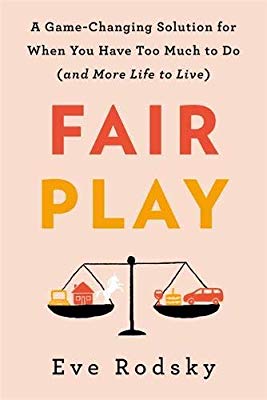“Figure it out,” my friend Beth said, recounting the last three words she’d told her husband before leaving the house. She slumped down into a chair at Starbucks and huffed, “It was a simple ask… Just pick up a birthday present for Katie’s friend on the way to the party, and now I get a text that says: At the mall. Gift ideas?”
Exasperated, she asked me: “Do I have to do everything?”
I thought back to a similar exchange between me and my husband. In the middle of a busy workday, I sent him a text with the link to our son’s school portal: Fill out Zach’s forms and bring to the teacher conference at 3? When my husband showed up with a stack of school forms except for the one required, I felt disappointed. I thought to myself: I should have just handled it.
Hold up. Rewind —
Over seven years ago, I embarked on a “quest” to uncover the root of discontent within many of our marriages and partnerships, which has resulted in my new book and time- and sanity-saving home management system, Fair Play. Since then, I’ve conducted over 500 candid interviews with women and men from all walks of life on the subject of the gendered division of labor in the home, and among many interesting findings, the conversations unveiled a single, problematic phrase: “Figure it out.” When I asked men who were married and ready to start a family about how they planned to handle childcare and housework, their number one answer was, “We will figure it out.” When I asked women who were married with kids the same question, many said they expected their partners to “figure it out.” And almost every married man with kids I interviewed said that nagging is what they hate most about home life, but these same men easily admit that they wait for their wives to tell them what to do at home. The top three responses for why they don’t take a lead: “You didn’t remind me,” “Why didn’t you just ask?” and, “If you tell me what to do, I’ll do it.”
This same approach is advocated in media and popular culture. I’ve read articles suggesting women go on strike (as in, I will not do laundry anymore!), move to a foreign country where only their husband knows the language, and in a recent article in The New York Times, women were encouraged to act “helpless” in an effort to force our partners to figure it out.
But left to figure it out, over time and especially after kids, this approach leads to what I call “she-fault” parenting, where the woman carries a significantly heavier portion of the domestic load, both physical and mental. Women continue to shoulder two-thirds of the work required to run a home and raise a family regardless of whether they work outside of the home, according to a 2012 study in the journal Social Forces. And a more recent survey by researchers at Harvard Business School revealed that 25 percent of divorced couples listed “disagreements about housework” as the top reason for breaking up.
The home is a sh*t show and no one seems to be able to pinpoint why
“I just don’t get,” Beth continued, as I mentally added her to my growing data set. “He’s a totally competent leader at work, but somehow he leaves his stealth management skills behind when he walks into our home… relying on me for every single detail, as if he’s clueless without my direction.”
Beth’s husband, Gary, is not a clueless man. In his day job, I knew that he managed a large international team of people. And he is good at it. So, what was happening at home? This got me thinking — why don’t we operate within our homes like we do in our offices, businesses, and high-functioning organizations? Imagine walking into work each morning and asking your colleague/teammate/manager/boss: Hey, can you remind me — what should I be doing today? And being assured off-handedly: Oh, you’ll figure it out.
This would never happen because it’s an unreasonable expectation. It would create colossal inefficiencies. And furthermore, it would make everyone nuts! So why, then, are we operating this way within our home organizations?
A new home system
When I thought back to that email I sent to my husband, I imagined him reading it and questioning, what form? (Admittedly, there were a half dozen to sign.) And where do I find it? (Any parent who’s attempted to navigate a school portal system understands that it’s a maddening labyrinth of dead ends.) In a validating instant, it all came together: I’d given my husband a randomly assigned task (what I now call a “R.A.T.”) and expected him to “figure it out.” This wasn’t fair to him.
I finally understood the part women are playing in the gender divide we complain so much about. We blame our partners for failing to meet our standards and expectations, but we may not be giving them the context and autonomy they need to understand the task at hand. When individual assignments, delineated roles, and explicitly defined expectations are absent, no one can be expected to figure it out. Not in any professional environment, nor within the home ecosystem.
I looked at Beth and cautiously offered, “What if we’re setting our partners up to fail? We expect them to read our minds and then we blame them for disappointing us? Hardly seems fair.”
Beth shot me a steely-eyed look and then sat back in her chair with a reluctant sigh: “You may have a point.”
The one-word solution to the three-word problem: context
Where “figure it out” can doom our relationships, clearly delineated roles, specific assignments, and explicitly defined expectations will make them thrive. In a word: context.
If we want to stop serving as the chief family nag and invite our partners to become true collaborators on the domestic front, we must retire our habit of issuing random assignments, demanding things on the fly, and delegating with no meaningful plan. By treating the home as our most important organization, we can begin to optimize efficiency and fairness in the domestic realm.
My interviews with all types of husbands/partners/fathers revealed that most men respond positively to a direct approach for help and support in the home when provided with clear directives and explicitly defined expectations. They willingly step up when they have the context to thoroughly understand the “ask” — the full assignment they’re being asked to deliver — and the role they’re being asked to play. Now, by asking for “help,” you are not soliciting a “helper” who merely executes on your command at the 11th hour (“Hey, can you go back to the store before it closes and pick up a few things?”), but a true collaborator who can take the lead with full context of the task at hand.
MORE context, LESS control
As we sipped our coffee, Beth softened, “So instead of Gary wandering around the mall aimlessly, do you think I should give him some more info on who the gift was for? I also forgot to mention that the party is for twins so technically it’s two presents. Oops.”
“An important detail,” I agreed. “Maybe you help him out this time. And then the next time a birthday party for a kid’s friend is on the calendar, you discuss the details ahead of time, so you have a shared understanding of the full task. The what, when, where, and most importantly, who will take the lead? Not just on the gift, but who will take ownership of the full event… transportation to and from the party, theme outfit, R.S.V.P., etc. From what I know about your husband, he will happily take the lead on a task and complete it successfully… but first, he has to know what his role is. Otherwise, you have a poor guy wandering around a mall.”
My initial quest for a solution to domestic imbalance led me to a big discovery: When couples unpack the details of home life through open communication, they’re rewarded by more efficiency, optimized productivity, and greater harmony in the home. By providing context, in which every task that benefits the home is not only named, but also explicitly defined and specifically assigned, both partners know in advance what they are responsible for.
Imagine a new homelife scenario where your request for “help” is met with: I’m on it. And to your delight, your partner willingly and quite competently completes the task at hand without reminders, nudging, or direction from you. In my own life, my husband now handles all school forms for our three kids while navigating the dreaded school portal without a wrong turn. And I never have to say a word.

Eve Rodsky is the author of Fair Play, a life-management system to help couples rebalance the domestic workload and reimagine their relationship, time, and purpose.


